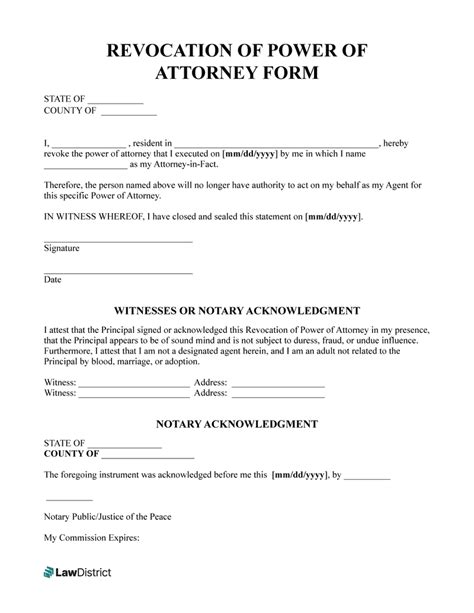Revoking Power Of Attorney

Revoking a Power of Attorney (POA) is a significant decision that can have profound implications for the grantor, the agent, and other parties involved. A POA is a legal document that grants an individual, known as the agent or attorney-in-fact, the authority to act on behalf of another person, known as the grantor or principal, in various financial, legal, and personal matters. However, circumstances may arise where the grantor wishes to revoke the POA, either due to a change in their relationship with the agent, a decline in the agent's trustworthiness, or a shift in the grantor's personal or financial situation.
Key Points
- Revoking a Power of Attorney requires a formal, written document that clearly states the grantor's intention to revoke the POA.
- The revocation document must be signed by the grantor and may require notarization or witness signatures, depending on the jurisdiction.
- Notification of the revocation must be provided to the agent, as well as any third parties who have been dealing with the agent under the authority of the POA.
- Revoking a POA can have significant consequences, including the potential for disputes or litigation, and should be approached with caution and careful consideration.
- It is essential to seek the advice of an attorney or other qualified professional to ensure that the revocation is executed properly and in accordance with applicable laws and regulations.
Understanding the Process of Revoking a Power of Attorney

The process of revoking a POA involves several steps, which may vary depending on the jurisdiction and the specific circumstances of the case. The grantor must first create a formal, written document that clearly states their intention to revoke the POA. This document may be a simple statement or a more complex legal instrument, depending on the jurisdiction and the requirements of the original POA. The revocation document must be signed by the grantor and may require notarization or witness signatures, depending on the applicable laws and regulations.
Notifying the Agent and Third Parties
Once the revocation document has been executed, the grantor must notify the agent and any third parties who have been dealing with the agent under the authority of the POA. This notification is crucial to prevent the agent from continuing to act on behalf of the grantor without their knowledge or consent. The grantor should provide written notice to the agent and third parties, which may include banks, financial institutions, healthcare providers, and other organizations that have been affected by the POA.
| Notification Requirements | Applicable Parties |
|---|---|
| Written notice | Agent, banks, financial institutions, healthcare providers |
| Notarization or witness signatures | Depending on jurisdiction and applicable laws |
| Verbal notification | Optional, but recommended for third parties who may be affected by the revocation |

Consequences of Revoking a Power of Attorney

Revoking a POA can have significant consequences, including the potential for disputes or litigation. The grantor should carefully consider the potential implications of revoking the POA, including the impact on their relationship with the agent and any third parties who have been affected by the POA. In some cases, the agent may resist the revocation or dispute the grantor’s authority to revoke the POA, which can lead to costly and time-consuming litigation.
Alternative Arrangements
In some cases, the grantor may wish to revoke a POA and establish alternative arrangements for managing their financial, legal, and personal affairs. This may involve appointing a new agent or attorney-in-fact, or establishing a trust or other estate planning vehicle. The grantor should seek the advice of an attorney or other qualified professional to determine the best course of action and ensure that their wishes are carried out in accordance with applicable laws and regulations.
Revoking a Power of Attorney is a serious decision that requires careful consideration and planning. The grantor should seek the advice of an attorney or other qualified professional to ensure that the revocation is executed properly and in accordance with applicable laws and regulations. By understanding the process and potential consequences of revoking a POA, the grantor can make informed decisions about their financial, legal, and personal affairs and ensure that their wishes are carried out with dignity and respect.
What is the process for revoking a Power of Attorney?
+The process for revoking a Power of Attorney involves creating a formal, written document that clearly states the grantor’s intention to revoke the POA, signing the document, and notifying the agent and third parties who have been dealing with the agent under the authority of the POA.
Do I need to notify the agent and third parties in writing?
+Yes, it is recommended that the grantor provide written notice to the agent and third parties to prevent the agent from continuing to act on behalf of the grantor without their knowledge or consent.
Can I revoke a Power of Attorney if I am incapacitated?
+If the grantor is incapacitated, they may not be able to revoke the POA themselves. In such cases, the court or other authorized parties may need to intervene to revoke the POA or make alternative arrangements for managing the grantor’s affairs.



